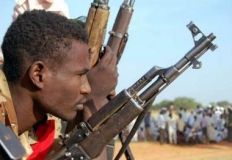Sudan’s Darfur rebel SLM set to split
Nov 2, 2005 (KHARTOUM) — The largest rebel group in Sudan’s war-torn Darfur region appeared set to split Wednesday, as its more militant wing readied to elect new leaders at a meeting boycotted by the incumbent president.
 “There will be an election for new leaders,” Mahjub Hussein, a London-based spokesman for the Sudan Liberation Movement (SLM), told AFP from the meeting venue in rebel-held Darfur near the central region of Kordofan.
“There will be an election for new leaders,” Mahjub Hussein, a London-based spokesman for the Sudan Liberation Movement (SLM), told AFP from the meeting venue in rebel-held Darfur near the central region of Kordofan.
Hussein represents the hardline faction of the SLM led by Secretary General Minni Arko Minawi, which organized the conference attended by thousands of Darfuris, some 800 delegates and a handful of foreign observers.
Organizers called the gathering in order to discuss reconstructing the group, plot a new strategy for the future and try to sort out differences between Minawi and incumbent chairman Abdelwahed Mohamed al-Nur.
Nur arrived in Darfur a few days before the meeting opened, but decided not to travel to the venue.
“I do not know why he’s refusing to come,” Hussein said.
The chairman’s supporters said he had not been consulted in advance.
“Nur is boycotting the meeting which is bound to fail since it was not convened with our accord,” one of his aides, Ahmed Mohamed Jibril, said.
The meeting was supposed to reconcile the two factions ahead of a new round of African Union-sponsored peace negotiations between the rebels and the government in Abuja, Nigeria, on November 21.
Nur participated in the talks in Abuja which adjourned in October. Minawi boycotted the round and rejected its conclusions.
Observers said the infighting threatened to increase the level of insecurity in the region and hamper efforts to find a peaceful settlement to the Darfur conflict that has been raging on for the past 32 months.
“Unless reversed, the slow implosion of the rebel movements threatens to extend the tragic situation in Darfur indefinitely,” the Brussels-based think-tank, the International Crisis Group (ICG), warned in a report last month.
“As long as the rebels, the (Sudan Liberation Army) SLA in particular, remain divided and the fighting in Darfur continues, there is little hope for real success at the African Union (AU)-sponsored peace talks in Abuja, since the government is likely to exploit and exacerbate rebel weaknesses at the table,” it added.
Hussein downplayed international concern about rifts within the SLA, the military wing of the SLM.
“The SLA remains united,” he said.
These concerns, he added, “are unfounded because Nur does not have the support of the military.”
Many have also warned that should the SLM conference elect a new leader and oust Nur, he may decide to form a splinter faction, further complicating the situation in the region, but Minawi’s group appeared unconcerned.
“I believe anyone has the right to establish an organization,” Hussein said.
Participants at the conference are due to vote for new leaders later in the day in an election that seems set to topple the internationally recognized leader of the SLM from the driver’s seat.
The ouster of the Islamist-leaning, yet moderate Nur could also escalate tensions with the militarily inferior Justice and Equality Movement (JEM), which Nur has been courting and wanted on his side.
“Discord within and between the rebel movements also needs to be resolved if there is to be a chance for lasting peace,” the ICG noted.
The SLM and JEM launched an armed rebellion against Khartoum in early 2003, demanding greater political and economy from the central government.
Successive rounds of AU-sponsored peace talks have so far failed to end the conflict, which has left some 300,000 people dead and displaced nearly 2.6 million.
(AFP/ST)
